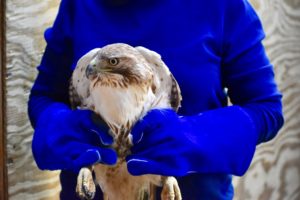PROVINCETOWN — Concerned residents have been calling the health dept. to report rat sightings in recent weeks, according to a public notice posted on the town website. The notice urges townspeople to eliminate the animals’ food sources by storing garbage in rodent-proof containers and install traps, or use poison if necessary, to mitigate the problem.
There is a lot humans can do to keep rats under control. But the chemicals used to poison them may actually undermine those efforts. That’s because they don’t just affect pest populations; rodenticides are entering the wider ecosystem, with devastating effects, including on raptors that make rats their prey.
Poisons affect birds of prey
The board of health hosted a discussion of alternative solutions on Sept. 19 at the Provincetown Public Library. There, Gary Menin of Raptors Are the Solution, a project of the Earth Island Institute, urged residents to stop using systemic rodenticides, the anticoagulant poisons used to kill rats.
Rats that consume such poisons become lethargic, making them easy prey for raptors like hawks and owls. When birds eat poisoned rats, they also ingest the rodenticide, which has resulted in increased raptor sickness and mortality.
Menin argued that, because they hunt rodents, birds of prey offer an alternative way to control rodent pests.
“A great horned owl will catch 50 a month,” he told the Independent. “It’ll put a dent in the population.” Using rat poison, he said, undermines this kind of natural control.
Executive Director Stephanie Ellis at Wild Care in Eastham said that raptor rodenticide poisonings have increased over the past few years. “It’s very alarming,” she said.
Birds of prey that have ingested rat poison are a sad sight.

“We will see lethargy, depression, and emaciation,” said Ellis. “In some cases, there will be bruising or hemorrhage. It’s an anticoagulant, so the birds can bleed internally. This shows up as bleeding from the mouth or nose.”
Rodenticides aren’t just affecting birds on Cape Cod. According to a 2011 Tufts study, 86 percent of raptors in Massachusetts were found to have rodenticide residues in their livers. Globally, raptor populations are diminishing, and poisonings certainly don’t help.
Rats are smart and sociable
Marie Mortreux, a postdoctoral fellow at Harvard Medical School, conducts experiments on rats in her research lab. She handles her animals every day and forms strong bonds with the rats, each of which has a unique personality, she said.
“Within two hours, I can tell what their character is,” said Mortreux. “Some are very cuddly, some are very quiet. Others are vocal, or sweet, or playful. They’re very smart, social creatures.”
Rats can learn tricks, enjoy being tickled, and even like to play hide-and-go-seek.
Mortreux loves playing with her rats, who are like pets to her. She thinks that giving them the best care improves her research because they become less anxious and easier to handle, and she knows them well enough to tell when something is wrong.
Mortreux thinks that there are many unfair misconceptions about rats.
“Dirty is the first word people say, because you see them in your garbage,” she said. “But they’re in your garbage because they’re foraging for food. A bear is the same, and you’d never say a bear is dirty.”
Humans are to blame
Rats learn to go where food is easily available. They thrive in poorly maintained dumpsters and in restaurants and homes where food scraps are accessible.
And humans are the ones teaching them, according to Mortreux. “Humans are getting lazy,” she said. “We litter everywhere. Rats come where the food is — they don’t even need to hunt. They just help themselves.”
Menin agreed. “We need to coexist with these creatures,” he said. Doing that responsibly, he argued, requires humans and raptors in complementary roles.
“If rats don’t have access to food, they’ll go outside,” he said. There, they are targets for birds of prey.



